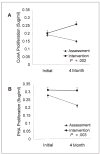Psychological, behavioral, and immune changes after a psychological intervention: a clinical trial
- PMID: 15337807
- PMCID: PMC2168591
- DOI: 10.1200/JCO.2004.06.030
Psychological, behavioral, and immune changes after a psychological intervention: a clinical trial
Abstract
Purpose: This randomized clinical trial tests the hypothesis that a psychological intervention can reduce emotional distress, improve health behaviors and dose-intensity, and enhance immune responses.
Patients and methods: We studied 227 women who were surgically treated for regional breast cancer. Before adjuvant therapy, women completed interviews and questionnaires assessing emotional distress, social adjustment, and health behaviors. A 60-mL blood sample was drawn for immune assays. Patients were randomly assigned to either the intervention group or assessment only group. The intervention was conducted in small patient groups, with one session per week for 4 months. The sessions included strategies to reduce stress, improve mood, alter health behaviors, and maintain adherence to cancer treatment and care. Reassessment occurred after completion of the intervention.
Results: As predicted, patients receiving the intervention showed significant lowering of anxiety, improvements in perceived social support, improved dietary habits, and reduction in smoking (all P <.05). Analyses of adjuvant chemotherapy dose-intensity revealed significantly more variability (ie, more dispersion in the dose-intensity values) for the assessment arm (P <.05). Immune responses for the intervention patients paralleled their psychological and behavioral improvements. T-cell proliferation in response to phytohemagglutinin and concanavalin A remained stable or increased for the Intervention patients, whereas both responses declined for Assessment patients; this effect was replicated across three concentrations for each assay (all P <.01).
Conclusion: These data show a convergence of significant psychological, health behavior, and biologic effects after a psychological intervention for cancer patients.
Figures


References
-
- Helgeson VS, Cohen S, Schulz R, et al. Group support interventions for women with breast cancer: Who benefits from what? Health Psychol. 2000;19:107–114. - PubMed
-
- Goodwin PJ, Leszcz M, Ennis M, et al. The effect of group psychosocial support on survival in metastatic breast cancer. N Engl J Med. 2001;345:1719–1726. - PubMed
-
- Spiegel D, Bloom JR, Kraemer HC, et al. Effect of psychosocial treatment on survival of patients with metastatic breast cancer. Lancet. 1989;2:888–891. - PubMed
Publication types
MeSH terms
Grants and funding
LinkOut - more resources
Full Text Sources
Medical
Research Materials

